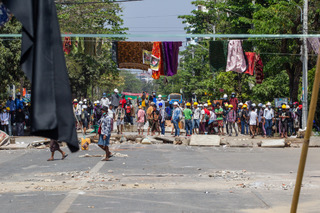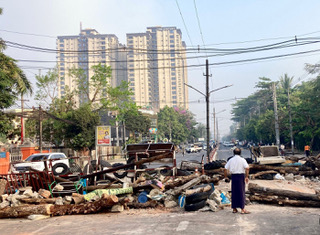The use of explosive weapons cause deaths, injuries and suffering for the people of Myanmar. After 3 months of protests, violent crackdowns and escalating clashes between the military and non-state armed groups, there are few signs of a decrease in the use of air and ground-launched attacks, including the widespread use of mortars, affecting villages and other populated areas. More than 750 people have been killed during crackdowns by security forces across the country, and many more have been injured while access to emergency medical assistance and rehabilitation is lacking. This new round of violence following the 1 February 2021 military coup is exacerbating needs and vulnerabilities in a country that was already facing pre-existing socio-economic inequalities, armed violence, widespread humanitarian needs, as well as a healthcare system struggling to cope with the COVID-19 pandemic.
Explosive weapons have been used by security forces in purported attempts to disperse protestors and clear protester-erected barricades, while the military has deployed air and ground-launched explosive weapons, such as mortars, in populated areas during renewed fighting in areas where armed groups and government forces have long fought for territorial control. Following the crackdowns on 9 April in Bago, one of the bloodiest days since the coup when more than 80 people died, local outlets reported the repeated use of grenades by Myanmar security forces to disperse protests and clear barricades. Explosive weapons, such as mortars and air-launched munitions, have been used in populated areas in Karen and Kachin states by the Myanmar military where fighting has killed and injured dozens of civilians and displaced thousands. Explosive weapons, such as grenades, have also been used to attack government forces and buildings.

© Maung Nyan / Shutterstock.com
Explosive weapons and violence will have a long-term, damaging impact on healthcare facilities. Reports document that restrictions to movement and fear of coming under attack are preventing civilians from reaching emergency clinics or hospitals. While few private medical facilities and local charities continue to be operational, testimonies describe military troops occupying hospitals, healthcare facilities being attacked by security forces, doctors and care providers being targeted. Bomb blasts were reported from military hospitals in Yangon. The supply of medicines is depleting. Those not receiving the appropriate trauma management support are more likely to suffer from the complications of injuries. This situation makes the response to COVID-19 even more difficult.
The use of armed violence and explosive weapons has exacerbated dire pre-existing conditions of people impacted by the conflict. A local aid organisation reports that up to 24,000 people have been forcibly displaced in Karen State. More than 100,000 people were already displaced in Kachin and Shan State before the escalation of violence and now face the threat of renewed airstrikes. Some fleeing from airstrikes have had to seek refuge, medical treatment, and humanitarian aid in neighbouring countries, including in Thailand.
The use of explosive weapons and violence is hampering humanitarian access in Myanmar. As a result, people are facing difficulties accessing the services they need. Destruction of civilian infrastructure, including schools and homes, is widely reported. The situation is getting more and more dangerous for humanitarian workers.

Residue of barricades left after protests against the military coup in Yangoon, Myanmar, April 2021.
INEW calls on all parties to conflict to stop using explosive weapons with wide area effects in populated areas due to the impact on civilians, including death, injury, displacement, lack of access to medical care and aid, and the destruction of essential infrastructure and vital services. The bombing and shelling in these towns and cities highlight the needs for new international standards against the use of explosive weapons with wide area effects in towns and cities. This includes weapons that produce a large blast area or spread fragments widely, weapons that deliver multiple munitions that saturate a large area, such as multiple-launch rocket systems, and inaccurate weapons where the effects of the weapon extend beyond the target. When used in cities and towns where there are concentrations of civilians, the risk of harm to civilians is great.
Over 100 countries have recognised the harm caused to civilians from the use of explosive weapons in cities, towns and other populated areas. INEW is working with States, led by Ireland, to develop an international political declaration to help prevent human suffering from the use of explosive weapons in populated areas and to ensure support to victims. INEW calls upon States to include in the elaboration of a political declaration, a commitment to avoid the use of explosive weapons with wide area effects in populated areas.
* * *
For media enquiries, please contact:
Uldduz Sohrabi
